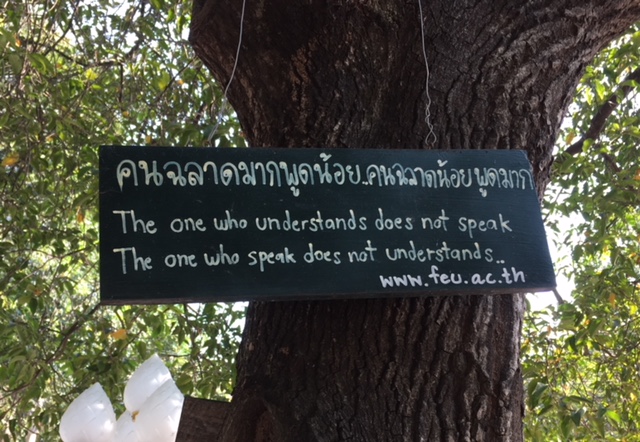I Thai Language Little Bit

I was very proud of myself. I successful asked a woman selling roasted bananas for "Ha glu-ay noy ka", or 5 bananas please. She then asked me something in Thai, which I couldn't figure out, so I responded in Thai that I didn't understand because "I Thai language little bit." As I walked away biting into one of the small browned bananas, I realized I forgot the verb: speak. So, while I did successfully communicate something, I did so at the level of about a four year old. Believe it or not, this is progress. I've moved up the linguistic ladder from a befuddled mute who can only say hello and thank you to a toddle with a vast lexicon filled with useful words, such as coffee, horse, very, go, small, and of course banana.
I've been taking Thai language lessons for about a week and half. When I signed up for the class, I imagined that I would be diligently studying every day after class for 2-3 hours. After all, I have been teaching English for over a decade. I was sure I would be a good student, and, though it would be hard, my unstoppable work ethic coupled with my love of language would inspire me to put in the long hard hours to master Thai in no time. I forgot that I would have other life responsibilities (like earning money) to attend to, and that Thai, like most other Asian languages, would be especially difficult because it is tonal. This means that the only thing differentiating two words is how long you say the vowel. For example, horse is pronounced ma, and dog is pronounced maaa.
Now, not knowing how to correctly say horse and dog probably won't be a problem unless you've been drawn to Thailand to study animal husbandry or to work on a farm in 100 degree weather. For the rest of us, there are more concerning language problems. For example, suu when pronounced with a low tone means buy. So, I could imagine myself saying "Dichan ja suu gaa-fee hai puak-rao ka," which means I will buy everyone a coffee! However, if I say suu in a slightly higher tone, suddenly I'm exclaiming, "I will fight coffee for everyone!" And God knows, I'm not going to fight my beloved coffee for anyone.
In fact, I need to be especially careful when ordering coffee. If I request that the person making my coffee "mai sai nam-dttaan ka," which means don't add sugar please, then I need to be careful to pronounce the final N. If I slur that N-sound at all, then suddenly I'm asking the barista to not put tears in my coffee. Even if he or she looks super sad, I don't think it's appropriate to assume my coffee will be cried in, and to suggest this would certainly be an insult.
If I'm trying to navigate a crowded supermarket, my arms stacked high with a day's supply of bottled water and bananas, and I bump into someone, I will attempt to say "Kow tote ka" -- please, excuse me. But more often than not, I'll be tired, and despite my best efforts, what I actually say will be something closer to, "Kow toot ka", which translates to "Please ass." Thai people are known to be warm and forgiving, but at the end of the day, if you bump into them and say "Please ass", they are not going to like you.
